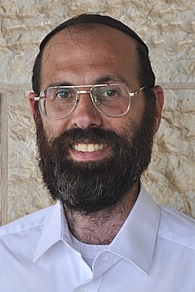Yirat Shamayim (Fear of G-d)
By: Rav Meir Orlian
Now, O Israel, what does Hashem, your G-d, ask of you? ONLY to fear Hashem, your G-d, to go in all His ways and to love Him, and to serve Hashem, your G-d, with all your heart and with all your soul; to observe the commandments of Hashem and His decrees, which I command you today, for your benefit. (Devarim 10:12,13) The word ONLY, which implies a minimal request, seems totally inappropriate to introduce this comprehensive list of demands. Fear of G-d (Yirat Shamayim) is in of itself a lofty ideal, let alone the remainder of the list! Chazal note this difficulty and ask (Berachot 33b), "Is Yirat Shamayim a small matter?!"
The Ramban, in fact, explains that the word "only" relates to the conclusion of the verses, "for your benefit." In other words, although G-d is demanding total service of Him, it is not because He needs it, but rather He demands it "for YOUR benefit." Moshe is essentially echoing G-d's words following Matan Torah, "Let it be that this heart should remain theirs, to fear Me and observe all My commandments all the days, so that it should be good for them and for their children forever!" (Devarim 5:26)
Chazal, however, interpret the word "only" as applying to the immediately following phrase, "to fear Hashem, your G-d." (Berachot 33b):
R. Chanina says: Everything is in the hands of G-d except for Yirat Shamayim, as it says, "Now, O Israel, what does Hashem, your G-d, ask of you? ONLY to fear Hashem." Is Yirat Shamayim a small matter? ... Yes, for Moshe it was a small matter, as R. Chanina said, "This is comparable to a person who is asked for a large vessel which he has; it seems to him like a small vessel. A small vessel which he doesn't have; it seems to him like a large vessel." Yirat Shamayim is, indeed, a "large vessel," and not something simple. However, since Moshe had already acquired this trait, he viewed it merely as a "small vessel," and was able to say "only." Many commentators raise the obvious difficulty with this passage. Although for Moshe himself Yirat Shamayim may have seemed a small matter, he was, after all, speaking to Bnei Yisrael, who were not at his level. For them, this demand of Yirat Shamayim remains a great matter!
Furthermore, Chazal emphasize the significance of Yirat Shamayim as essential for the preservation of wisdom (Shemot Rabbah 30:11):
A person learns midrash, halachot, and aggadot. If he does not have fear of sin -- he has nothing! This is comparable to a person who said to his friend, "I have a thousand measures of grain; I have a thousand measures of oil and a thousand of wine." His friend said to him, "Do you have storehouses to put them into? If you do have, everything is yours; if not -- you have nothing!" So too, a person learns everything. They say to him, "If you have fear of sin, everything is yours," as it says, "Fear of Hashem is his treasure." (Yeshayahu 33:6) Why is this particular trait so important specifically for wisdom?
To explain this completely would require an understanding of the term "fear of G-d" in its different forms and levels. Abarbanel, Mesillat Yesharim, and the Netziv deal with this at length. Perhaps we can answer these questions, though, based on one of the simplest aspects of "Yirat Shamayim."
Rashi, in his commentary to the gemara (s.v. hakol) defines Yirat Shamayim as choosing to be righteous, not wicked. One of the bases of this choice is approaching G-d in a straightforward manner, as we find regarding Iyov, "That man was wholesome and straightforward (yashar), G-d fearing and shunned evil." Conversely, the gemara states (Berachot 59a), "Thunder was created just to straighten the twistedness of the heart, as it says, "G-d has acted so that [man] should fear Him." (Kohelet 3:14) Straightforwardness is the key to Yirat Shamayim; twistedness of the heart is its antithesis.
Furthermore, Kohelet (7:29) teaches us that man was created with a straightforward nature, "G-d has made man straightforward (yashar), but they sought too much reasoning." People have a natural sense for the truth, perhaps what we commonly term an "inner conscience." People sin, however, because they rationalize and overrule their inner conscience. Yirat Shamayim is the trait which ensures that a person maintains his straightforwardness, and does not succumb to his rationalization. When Chazal say, "Everything is in the hands of Heaven except for Yirat Shamayim," this means, then, that a person is granted free will to follow his inner conscience or to follow his rationalizations. While Moshe obviously reached the highest levels of Yirat Shamayim, the most basic level is something which is within everyone's grasp. Since man is created with this as a natural instinct, it is fair to say to Bnei Yisrael "only."
We now understand, as well, the connection between Yirat Shamayim and the preservation of wisdom. The more wisdom a person has, the more he will be able to rationalize and to convince himself against the truth. His wisdom, then, can become a source of sin. In this sense, Yirat Shamayim serves as the preservative to ensure that wisdom will be applied correctly to bring people to righteousness and greater service of G-d.
With this we can also understand the close link between the traits of Yirat Shamayim and Anavah (humility), as it says in Mishlei (22:4), "The result of humility is fear of Hashem." Similarly, we find in the famous "ladder" of R. Pinchas b. Yair (which forms the basis of Ramchal's classic work, Mesillat Yesharim), "Humility bring to fear of sin." (Avoda Zara 20b) A person who is humble will not seek to rationalize in order to gain, but will be straightforward and be willing to accept the dictates of his inner conscience. As such, it is understandable that since Moshe had reached the pinnacle of humility (cf. Bamidbar 12:3), he clearly possessed the trait of Yirat Shamayim as well.
Perhaps we can even connect the simple meaning of the verse, as explained by the Ramban, to the interpretation provided by Chazal. Indeed, all that G-d wants from us is for our benefit. However, the true benefit of man is achieved through service of Hashem and following the way of G-d, not through the various means that man rationalizes to himself.
This approach can also explain R. Meir's law, based on this verse, that a person must make one-hundred blessings daily. (Menachot 43b. See Daat Zekainim who explains the textual basis of this drasha.) A person who declares one-hundred times daily that G-d is the source of all good (and sorrow) in this world, will be able to maintain Yirat Shamayim and not seek to gain through rationalization and illegal means.
Shiur ID: 3854
Do you have a comment or question on the shiur?
Comment below and we'll join the discussion
Add your comments:




.jpg)


